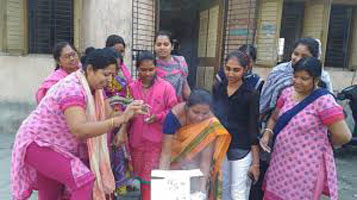NE LEGAL BUREAU
NEW DELHI, JAN 13
The Supreme Court on Wednesday directed the states and Union Territories to decide by January 31 the reopening of Anganwadi centres, which were closed amid the COVID-19 pandemic last year and presently situated outside the containment zone.
Observing that government has its primary duty and a constitutional obligation to preserve human life and good health of its citizens, the apex court directed all states and Union Territories (UTs) to ensure that nutritional standards provided under the National Food Security Act, 2013 is fulfilled by providing nutritional support to pregnant women, lactating mothers and children who suffer from malnutrition.
A bench headed by Justice Ashok Bhushan directed that all states and UTs shall issue “necessary orders regarding monitoring and supervision of Anganwadi centres to ensure that the benefit reaches to the beneficiaries and a complaint redressal mechanism be put in place in each district”.
The bench, also comprising Justices R S Reddy and M R Shah, said that decision for not opening Anganwadi centres in any state or UT shall be taken only after the concerned state disaster management authority directs for not opening of centres in the particular area situated outside containment zone.
“Anganwadi centres situated in the containment zone shall not be opened till the containment continues,” the bench said in its 31-page verdict delivered on a plea that had raised the issue of closure of Anganwadi centres.
“Inadequate supply of nutritious food to the citizens, more particularly to the children and the women shall affect their health. Therefore, the same shall violate their fundamental right to health/right to live with dignity guaranteed under Article 21 of the Constitution of India,” it said.
The top court noted in its verdict that Anganwadi centres have been opened in some states and UTs.
“We are of the view that unless there are any specific reasons for not opening of Anganwadi centres, all Anganwadi centres beyond the containment zones should be made functional by all the States/Union Territories at an early date. All states may review the situation and take positive decisions on or before January 31, 2021, and unless there are specific decisions taken by the State Disaster Management Authority of a particular state, Anganwadi centres are opened on or before January 31, 2021,” it said.
“Children are the next generation and therefore unless and until the children and the women have the nutritious food, it will affect the next generation and ultimately the country as a whole. No one can doubt that children are the future of our country and if there is some stinginess in providing them with adequate nutrition, the country as a whole is deprived in the future of taking the benefit of their potential,” the bench said.
It said international covenants also aim at the highest attainable standards of physical and mental health and this is in the interest of social justice.
“As observed above, it is now statutory obligation of the Centre and the states to provide for nutritional support to the pregnant women and lactating mothers, nutritional support to children and to take steps to identify and provide meals for children who suffer from malnutrition,” it said.
The bench noted that Anganwadi centres were closed after the issuance of March 24 last year order by the Ministry of Home Affairs (MHA) for containment of COVID-19.
It said that the Ministry of Women and Child Development had in its March 30 last year letter directed issuance of necessary instructions to the district authorities to utilise services of Anganwadi workers/helpers for providing supplementary nutrition to beneficiaries at their doorsteps.
It noted that the Ministry of Women and Child Development had issued a guidance note on November 11, 2020, which provided resumption of Anganwadi Services outside containment zones after complying with health and safety protocols.
It also referred to the MHA’s November 25 last year order, which contained a paragraph that persons above 65 years of age, persons with co-morbidities, pregnant women, and children below the age of 10 years are advised to stay at home, except for essential and health purposes.
“The above guidelines have been issued keeping in view the protection of vulnerable persons and which requires pregnant women, children below the age of 10 years to stay at home except for essential and health purposes. Services which are being provided by Anganwadi centres are essential services,” the bench said.
It said that states and UTs, in their affidavits, have given details of providing take-home rations as per the guidelines and requirement contained in the 2013 Act.
“Most of the states/Union Territories have mentioned cereals as take-home ration for the beneficiaries from 3 to 6 years of age. The State of Maharashtra claim to supply wheat/rice-62 grams, masoor dal-28 grams, chana-30 grams, mirchi powder-4 grams, turmeric powder-4 grams, salt-8 grams, soybean oil-10 gram per day per beneficiary,” it noted.
It said the “big question” is as to what extent the implementation is on the ground and benefits are extended to beneficiaries as required by statute.
“The beneficiaries which belong to a vulnerable class are not equipped with suitable mechanisms to raise issues of non-implementation and not providing food articles complying with nutritional standards as provided in the statute,” it said.












